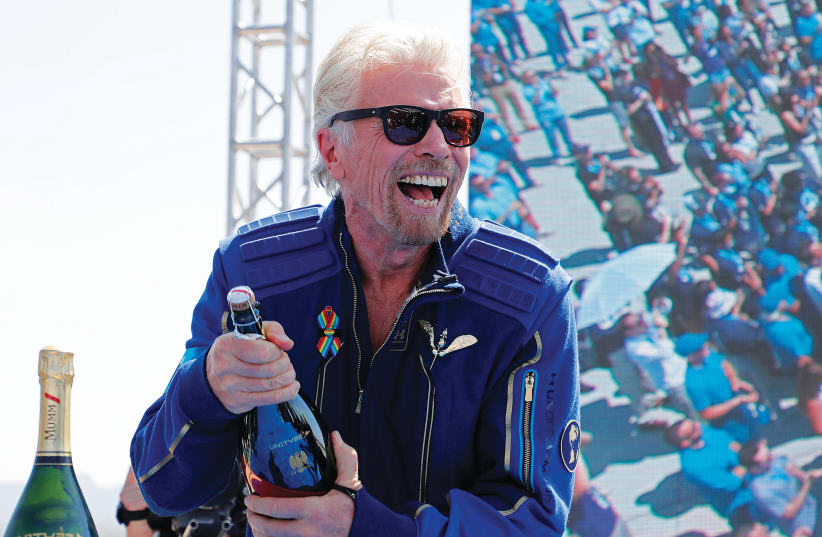In fact, Branson’s 60-minute flight, including its several minutes’ flirtation with weightlessness, is the Great Discoveries’ caricature. This flight explored no new horizons and involved little risk.
The real discoverers sailed into the unknown where they spent years braving tempest, hunger and disease between unmapped lands and uncharted seas. Many indeed lost their lives.
Scott, who froze to death after trekking 1,000 kilometers through arctic blizzard; and Ferdinand Magellan, who was killed halfway through an effort to circumnavigate the Earth – would laugh at the sight of a 70-year-old tycoon who after 60 minutes in a first-class armchair was being hailed as an explorer.
This does not mean that Branson’s effort is either shameful or futile. There is no shame in striving skyward, a human quest since antiquity, and there is no law against throwing out the window $250,000, least of all when that sum is but a fraction of a well-earned fortune.
Similarly, we middle-class simpletons are in no position to dismiss this cash-filled threesome’s belief that they are pioneering a new branch of tourism; one that will soon lead others through the stratosphere, and generate yet more profits for the select few already in a position to visit outer space.
Moreover, had we been able to afford this experience, most of us would readily climb the rocket plane in which we, too, would swim in the air while seeing through the window Earth morphing into a silvery curve wrapped in interstellar dark.
The question therefore is not what this expedition means about its hero, but whether it bears any value other than its travelers’ profit and thrill, and the answer is that it does not.
HAVING COINED one of commercial history’s most ingenious brand names – Virgin – Branson took it to legendary success in multiple industries, from transport (Virgin Air, Virgin Rail) through vacations (Virgin Holiday) to music (Virgin Records), along with some 400 companies that now add up to Virgin Group.
Virginity connotes the most elemental human wishes: fertility, beauty and youth. In setting up Virgin Galactic, Branson suggested that outer space, until then a matter of curiosity and adventure, can also be a matter of promise and desire.
That is certainly what his rival, Amazon founder and owner Jeff Bezos, thought when he said, “We have to go to space to save Earth.” Inspired by his Princeton Prof. Gerald O’Neil’s The High Frontier, Bezos “dreams of the day when millions of his fellow earthlings would relocate to colonies in space.” (Franklin Foer, “Jeff Bezos’s Master Plan,” The Atlantic, November 2019)
Yes, the moneyed explorers may not be risking as much as Scott and Magellan did, but the sense of gospel they cultivate, that what once sprawled beyond the ocean now looms beyond the sky, is tempting, and since the landing on the moon it is also convincing; the natural continuation of John Kennedy’s famous depiction of outer space as the New Frontier.
Yes, in outer space we might defy not only gravity, but also history and geography, leaving behind us myriad legacies of conflict, jealousy, vendetta and war, over country, tribe, clan and class.
There is only one problem with this prophetic vision: It won’t happen.
FIFTY-THREE years after humans first touched another planet we are not one inch closer to planting human life anywhere other than Earth.
Yes, we can install space stations in which, with an enormous industrial effort and financial investment, a handful of people can subsist in socially unsustainable conditions for a limited period of time. Otherwise, there is no substitute for our planet’s exquisite cocktail of water, oxygen, warmth, chill, heat, frost, darkness and light.
If anything, since the landing on the Moon, we have made life on this planet more physically questionable than it was at any point since Noah’s Flood.
Why seek life in planets where temperatures average -28 (Mars) and -128 (Jupiter) Celsius (-18° and -198° Fahrenheit) or where they can plunge within 24 hours from 100 above zero to 170 below zero (212° and -274°F on the Moon), while here on Earth we are shocked when California registers a lone day of 54 degrees (129°F), as it did last week?
No, the space that sprawls beyond the planet is not the solution, just like the space that is under our feet is not the problem. The problem is what we do and don’t do with the space we inhabit.
What the human race is doing in this regard is well known – it is wrapping its planet with industrial poison – but what it is not doing is less known: Mankind is failing to conquer the vast deserts that constitute one third of planet Earth.
If we can fly 80 kilometers high, we can lead water from where it exists to where it does not exist. This is much more urgent, and infinitely more feasible, than colonizing outer space.
Imagine where the world would be if today’s 400 million Arabs had been able to settle across the deserts of Saudi Arabia, Libya, Syria, Iraq and Sudan. Think of how Africa could be transformed if the Sahara could be carpeted with villages, cities, rivers, forests and fields of barley, cotton, wheat and soy.
These deserts as well as the vast desolations of Australia, China, Mongolia and America are worth Big Money’s resources much more than outer space.
Such an investment – call it Virgin Desert – may be less sexy than a weightless dance in a telecast spaceflight, but unlike Virgin Galactic, it could really change the world.
Amotz Asa-El’s bestselling Mitzad Ha’ivelet Ha’yehudi (The Jewish March of Folly, Yediot Sefarim, 2019), is a revisionist history of the Jewish people’s leadership from antiquity to modernity. www.MiddleIsrael.net
